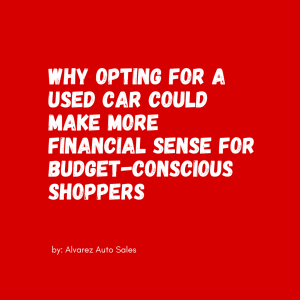Why Opting for a Used Car Could Make More Financial Sense for Budget-Conscious Shoppers
Posted Friday, Feb 02, 2024

In today's fast-paced world, having a car has become a necessity for many rather than a luxury. Whether it's the daily commute, running errands, or planning weekend getaways, a reliable mode of transportation is essential. However, as the costs of new cars continue to soar, those mindful of their budgets often face a financial dilemma.
While the allure of a brand-new vehicle straight from the dealership is undeniable, it typically comes with a hefty price tag that can challenge even the most well-thought-out budgets. Let’s explore why buying a used car can be a wise choice for those keeping a watchful eye on their wallets.
1. Lower Initial Cost
When considering a used car, one of the most obvious and immediate advantages is the significantly lower initial cost than a new vehicle. The stark contrast in price tags between new and used cars can be eye-opening. New cars often come with a premium price that includes the base cost and additional expenses like dealer fees, taxes, and higher insurance premiums.
Used cars, on the other hand, offer a more budget-friendly entry point into car ownership. While the price reduction varies depending on factors such as make, model, age, and mileage, it's not uncommon to find a used car with a price tag that's a fraction of what you'd pay for the latest model.
2. Depreciation
One crucial factor contributing to the lower cost of used cars is depreciation. As soon as a new car leaves the dealership lot, it begins to lose value rapidly. This phenomenon, known as depreciation, means that a new car can lose up to 20-30% of its value within the first year and continues to depreciate significantly over the next few years. In contrast, used cars have already absorbed the brunt of this depreciation, making them a more financially sensible option.
3. Reduced Registration Fees and Taxes
When you purchase a new car, the registration fees and taxes can be surprisingly hefty, often catching buyers off guard and adding a significant burden to the overall cost of ownership.
Used cars, however, offer a welcome respite in this regard. Since these fees are typically calculated based on the vehicle's value, a used car's lower purchase price translates directly into lower registration fees and taxes. This means that not only do you pay less upfront for the car itself, but you also save on the associated government fees.
The amount you can save on registration and taxes depends on your location and the specific regulations in your area. Still, it's not uncommon for these savings to be hundreds or even thousands of dollars when choosing a used car over a new one. For budget-conscious individuals, this reduction in ongoing expenses is a significant advantage.
Reduced registration fees and taxes are another way buying a used car aligns perfectly with a budget-conscious approach. These savings can free up additional funds for other essential financial goals, such as building an emergency fund, paying off debts, or investing in your future.
4. Lower Insurance Costs
Budget-conscious buyers often face the challenge of securing affordable car insurance that won't strain their finances. Fortunately, one of the significant benefits of buying a used car is the potential for lower insurance costs.
Car insurance premiums depend on several factors, including the vehicle's make, model, age, and safety features. Used cars, especially those a few years old, generally have lower insurance premiums than brand-new vehicles.
This happens for several reasons:
- Lower Car Value: Used cars have already undergone significant depreciation, which means they are valued lower than new cars. As insurance premiums partly depend on the car's value, lower-valued used cars result in lower premiums.
- Reduced Risk of Theft or Vandalism: Thieves and vandals often target new cars due to their desirability. Used cars, especially older models, are less likely to be targeted, leading to reduced insurance rates.
- Lower Replacement Costs: In the event of an accident, used cars typically cost less to repair or replace than new ones, which can translate into lower comprehensive and collision coverage rates.
- Less Expensive Parts: Replacement parts for older cars are usually more accessible and affordable, reducing repair costs and, consequently, insurance rates.
These factors make insuring a used car a more cost-effective choice for budget-conscious buyers. The money saved on insurance premiums can be redirected towards other essential expenses or financial goals, making the overall cost of car ownership more manageable.
When considering a used car, obtaining insurance quotes from multiple providers is crucial to ensure you get the best deal. Factors like your driving history and location influence your insurance rates, so maintaining a clean driving record and exploring discounts can reduce your insurance costs.
5. Maintenance and Repairs
One common misconception that budget-conscious buyers may have about used cars is that they are less reliable than their brand-new counterparts. However, modern vehicles have significantly improved durability and longevity, making them a reliable and cost-effective option for those on a budget.
Here's why maintenance and repair costs for used cars are not the financial burdens they once were:
- Longer Lifespans: Used cars today are built to last longer than ever before. Properly maintained, many used cars can easily exceed the 100,000-mile mark and continue running well with regular upkeep.
- Improved Reliability: Manufacturers have refined their engineering and quality control processes, producing more dependable vehicles. This means fewer unexpected breakdowns and costly repairs for budget-conscious owners.
- Lower Ownership Costs: Older cars tend to have fewer complex electronic systems that can be costly to repair. Basic maintenance, such as oil changes, brake pad replacements, and tire rotations, is needed to keep a used car running smoothly.
- Vehicle History Reports: When buying a used car, you can access its vehicle history report, which provides information about past accidents and maintenance records. This transparency lets you decide about the car's condition and potential repair history.
To ensure that you're purchasing a reliable used car, it's essential to conduct a thorough pre-purchase inspection. A qualified mechanic can assess the vehicle's condition, identify any potential issues, and provide you with a clear picture of its maintenance needs. This proactive step can help you avoid purchasing a car with hidden problems and ensure you're making a sound investment.
While budget-conscious buyers may be concerned about maintenance and repair costs, choosing a well-maintained used car can significantly reduce these expenses over the long term.
Final Thoughts
For budget-conscious buyers, buying a used car is not just a practical choice but a financially savvy one. It allows you to save money upfront, reduce ongoing expenses, and allocate resources towards other essential financial goals. Ultimately, buying a used car aligns perfectly with financial responsibility and sustainability principles.
If you're considering purchasing a used car, it's essential to approach the process with care. One reputable source to explore your options is Alvarez Auto Sales LLC. By choosing a reputable dealership like Alvarez Auto Sales LLC, you can access a wide selection of well-maintained used cars, benefit from their expertise, and ensure a transparent buying experience.

